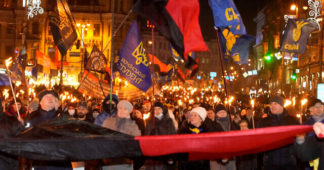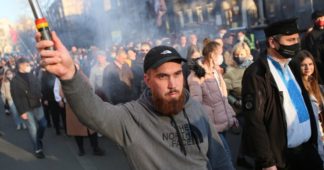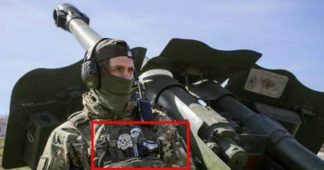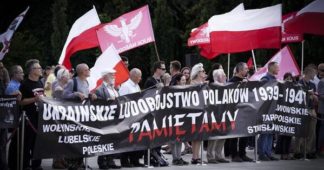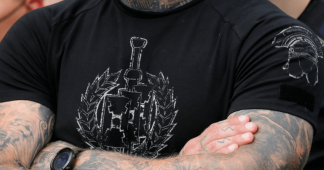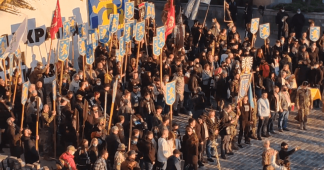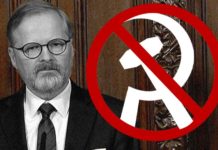By Tom Mackaman
6 June 2023
The New York Times published yesterday a column by Paul Krugman dismissing the role of Ukrainian fascists in the mass murder of Jews and Soviet citizens during World War II and minimizing as mere “shadows” their prominence in the present NATO proxy war against Russia. Krugman’s comment, “The Eyes of the World are Upon Ukraine,” is a thoroughly dishonest and cynical apology for Ukrainian fascism, past and present.
The column comes one day after the appearance of a Times feature article, “Nazi Symbols on Ukraine’s Front Lines Highlight Thorny Issues of History.” In that piece the Times editors attempted, as WSWS International Editorial Board Chairman David North noted, to palm off “deep historical and present-day links of Ukrainian nationalism to Nazism and genocide” as a mere “public relations problem for media propagandists, who are trying to sell NATO’s proxy war as a struggle for democracy.”
The Times article evoked considerable outrage, both because it lifts the lid on the embrace of Nazi ideology in the Ukrainian military, and because it acknowledges that the Times and other media outlets have been censoring images of Ukrainian soldiers wearing “patches featuring symbols that were made notorious by Nazi Germany and have since become part of the iconography of far-right hate groups.”
Krugman, who usually writes Panglossian commentary on the economy, was brought in to put out the fire. Unfortunately for the Times, Krugman is completely ignorant of history.
A pretext for the column was provided by the 79th anniversary of the June 6, 1944 Allied D-Day invasion of Normandy in World War II. Krugman absurdly heralds the recently launched Ukrainian offensive against Russia in the Donbas and southern Ukraine as “the moral equivalent” of that battle in the war against Nazi Germany. Both, according to the Nobel-prize winning economist, are about “good versus evil.”
To Krugman, Ukraine is just like “the great democracies” that fought against Nazi Germany. Similar to the US in the 1940s, Ukraine also has “flaws,” even “a darker side” consisting of “corruption” and “a far-right movement, including paramilitary groups that have played a part in its war” in which “Nazi iconography is still disturbingly widespread.” But what, after all, is a little fascism among friends? Nazi paramilitaries and white supremacist ideology are mere “shadows” in an “imperfect but real democracy,” Krugman assures Times readers.
There is, in fact, no “real democracy” in Ukraine. Kiev has outlawed opposition parties and illegalized all criticism of the war. Individuals accused of “collaboration” are hunted down and prosecuted. Those agitating for an end to the slaughter have been arrested, tortured and disappeared. Like Russia and the other Soviet successor states, the country is ruled over by a kleptocracy that emerged out of the old Stalinist bureaucracy. The Ukrainian oligarchy guards its ill-gotten wealth with the aid of Europe’s most repressive labor laws in a society that, even before the war, was among Europe’s poorest. As for “national freedom,” Kiev is waging a vicious campaign against the Russian language, which is spoken by a large percentage of the country, and represses the languages and cultures of other minorities—including Hungarians, Poles and Romani.
Krugman mentions none of this, of course. He admits only that which can no longer be denied—the embrace of Nazism by Ukraine’s military. To Krugman, this regrettable fact is only a matter of the Ukrainian elite not living up to supposedly long-held democratic ideals.
Quite the opposite is the truth. Complicity in the Holocaust and in Nazi Germany’s Operation Barbarossa invasion of the Soviet Union is the central, defining feature of Ukrainian nationalism.
In order to lie about the present, the Times must falsify the past. It therefore must sanitize the progenitors of today’s Ukrainian fascists, Stepan Bandera and his OUN (Organization of Ukrainian Nationalists), which was among the most vile and homicidally racist in a network of such organizations that emerged in Europe in the 1920s and 1930s.
According to Krugman, anything that the OUN did in World War II was the entirely understandable response of Ukrainian freedom fighters to Soviet oppression. He writes:
“The country suffered terribly under Stalin, with millions dying in a deliberately engineered famine; as a result, some Ukrainians initially welcomed the Germans during World War II (until they realized that they, too were considered subhuman) and Nazi iconography is still disturbingly widespread.”
This sentence is a series of outrageous lies that resurrects the historical falsifications of the right-wing apologists of German Nazism. In the first place, the famine that hit the USSR in the early 1930s devastated both Ukrainian and non-Ukrainian areas of the country and resulted from Stalin’s reckless drive for collectivization. No credible historian supports the far-right Ukrainian myth that it was “deliberately engineered” in a manner remotely comparable to Nazi Germany’s systematic, industrial annihilation—specifically endorsed by leaders of the OUN—of European Jewry.
As for the Ukrainian fascists’ “welcome” of the Nazis, it involved dozens of pogroms, including one in Lviv in which 6,000 Jews were murdered. They participated in atrocities such as the notorious Babi Yar massacre in which over 33,000 Jews were killed in just two days. Contrary to Krugman’s claims, the OUN support for the Nazis continued throughout the war and carried on even after it in terrorist warfare in the country’s far west.
Once the OUN was finally stamped out in Ukraine, émigrés—a great many of whom wound up in Canada—carried forward the fascist torch. Then, after the restoration of capitalism in the former Soviet Union, the fascists returned. Ever the playthings of the Western imperialists, it was the Ukrainian neo-fascists in collaboration with the American and German spy agencies who spearheaded the 2014 Maidan protests that toppled the Yanukovych government, which had attempted to balance between NATO and Russia.
Krugman finally gets to his real concern, late in the column. He writes:
“Vladimir Putin’s Russia is a malevolent actor, and friends of freedom everywhere have to hope that it will be thoroughly defeated. I wish I could say that the citizens of Western democracies, America in particular, were fully committed to Ukrainian victory and Russian defeat. In reality, while most Americans support aid to Ukraine, only a minority are willing to sustain that aid for as long as it takes.”
Viewing the conflagration from his multimillion-dollar Riverside Drive apartment, Krugman is one of the those “willing to sustain that aid for as long as it takes”—to fight to the very last Ukrainian. The view is altogether different for the masses of workers buckling under war-driven inflation and social austerity.
Krugman laments that some who oppose the war do so because to them “it’s always 2003,” and “they remember how America was taken to war [in Iraq] on false pretenses.” He worries that those who remember the illegal invasion of Iraq “can’t see that this situation is different.” He wishes very much that the public would see the latest American crusade for “freedom” as distinct from all the other rampages that have come before, and to view this particular bogeyman, Putin, as far more wicked than Milosevic, Hussein, Gaddafi, Assad, and so on.
The “situation” in Ukraine is not only not “different” than that in Iraq. Both conflicts form part of a longer concatenation of events tracing back to the restoration of capitalism in the Soviet Union. The American ruling class viewed that event as creating a “unipolar moment.” What has followed is an unending series of wars and provocations aimed at tightening the circle around the Eurasian landmass, with Russia and China at the center.
This is why, in spite of repeated promises that NATO would not expand, post-Cold War additions to the anti-Russian alliance now stretch from Finland in the north to Bulgaria in the south. It was indeed the Kremlin’s fear of Ukraine’s entry into NATO that provoked Putin into his disastrous and reactionary invasion.
Krugman’s woeful ignorance of history is not the exception but the rule. In the Times editorial boardroom, the past has purely propagandistic and utilitarian value. What actually happened is of no importance and indeed must be discarded if it conflicts with immediate political calculations. If the order of the day is to create a story of a “fight of good against evil,” as Krugman sets out to do in his column, then the criminal role of Ukrainian fascists in World War II, including the mass murder of Ukraine’s Jews, must be reduced to so many “shadows.”
The great irony is that, while the Times “pleads for a tolerant stance toward the prevalence of Nazi ideology in Ukraine,” as David North put it, the newspaper shows no such clemency toward the American Revolution and Civil War. The purpose of the Times’ massive 1619 Project was to smear and demean these events which, whatever their limitations, were genuine revolutions that raised up the banner of human equality. While statues of the fascist mass murderer Stepan Bandera go up in Kiev with the support of the Times, statues of Jefferson, Washington and Lincoln come down in America—also with the support of the Times.
The lie, Trotsky once said, is the cement of political reaction. That the flagship newspaper of American liberalism can no longer tell the truth about the past must be taken as a warning.
We remind our readers that publication of articles on our site does not mean that we agree with what is written. Our policy is to publish anything which we consider of interest, so as to assist our readers in forming their opinions. Sometimes we even publish articles with which we totally disagree, since we believe it is important for our readers to be informed on as wide a spectrum of views as possible.
